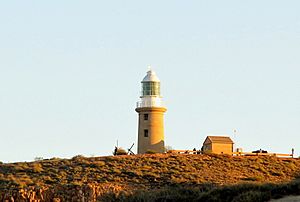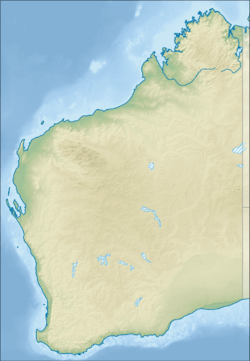Vlamingh Head Lighthouse facts for kids
 |
|
|
|
|
| Coordinates | 21°48′28″S 114°06′41″E / 21.8077°S 114.1115°E |
|---|---|
| Year first lit | 1912 |
| Deactivated | 1969 |
| Official name | Vlaming Head Lighthouse Group |
| Type | State Registered Place |
| Designated | 22 May 2007 |
| Reference no. | 837 |
The Vlamingh Head Lighthouse is a special lighthouse located about 17 kilometers (10.5 miles) north of Exmouth, Western Australia. It stands tall overlooking Lighthouse Bay. This lighthouse is famous because it's one of the few places in Australia where you can watch both the sun rise and the sun set over the ocean!
Contents
The Lighthouse Story
Early Explorers
Long ago, in 1618, a Dutch sailor named Haevik Claezoon van Hillegom was the first to see this part of Australia. Later, in 1696, another Dutch explorer, Willem de Vlamingh, mapped the area. In 1801, Nicolas Baudin named the spot Cape Murat.
Building a Lifesaver
For many years, the northwest coast of Australia was very dangerous for ships. It's one of the trickiest coastlines in the world! People knew a lighthouse was needed here. In 1907, a group of experts asked ship captains where the best places for lighthouses would be.
Even though Vlamingh Head was suggested, it didn't get enough votes at first. But then, a ship called the SS Mildura crashed near the North West Cape in 1907. This accident showed everyone how important a lighthouse was for this area.
So, in 1909, the Harbour and Lights Department announced that a lighthouse would be built at Vlamingh Head. Building started in November 1911. It was a tough job! Workers faced problems like bad drinking water and sickness. All the building materials had to be brought by sea from Fremantle.
Lighting the Way
The lighthouse began working on November 10, 1912. Its light was so strong it could be seen up to 22 nautical miles (about 41 kilometers or 25 miles) away! Two lighthouse keepers were needed to keep the light burning.
The light used kerosene and flashed twice every 7.5 seconds. The keepers lived in nearby houses. Supplies like fuel and food were brought by boat to the beach. Then, horses pulled them on a small tramway up to the lighthouse. The lighthouse helped guide ships for 60 years. In 1969, a new light on a tower at the Naval Communication Station Harold E. Holt took over its job.
Wartime and Weather
During the Second World War, the North West Cape was very important. US Navy ships used it to refuel. An airbase was also built nearby at RAAF Base Learmonth. This led to a radar station being built close to the lighthouse.
In 1953, a powerful cyclone hit the area. It badly damaged the airbase, the radar station, and even the lighthouse and the keepers' homes. The brave lighthouse keepers did much of the repair work themselves!
Visiting the Lighthouse
Today, the Vlamingh Head Lighthouse is a popular place for visitors. It's the end of a beautiful drive from Exmouth. The Ningaloo Lighthouse Holiday Park is also located nearby.
People love to visit for the amazing views and to watch the sunset. It's also a great spot for whale watching during certain times of the year. Information signs are there to help you learn more about this historic site.
 | Janet Taylor Pickett |
 | Synthia Saint James |
 | Howardena Pindell |
 | Faith Ringgold |


